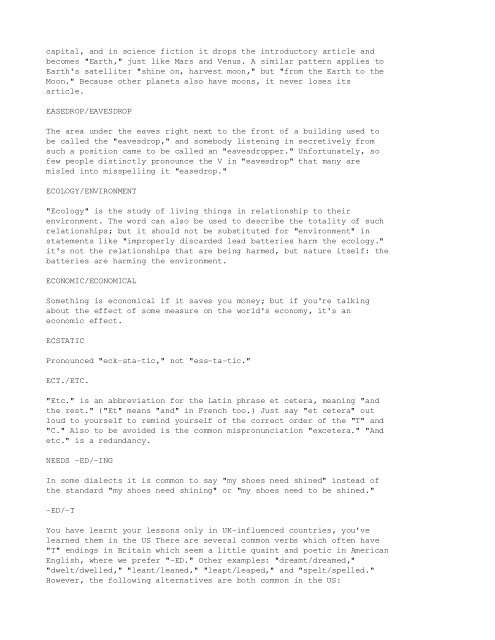Common_Errors_in_English_usage
Common_Errors_in_English_usage
Common_Errors_in_English_usage
Create successful ePaper yourself
Turn your PDF publications into a flip-book with our unique Google optimized e-Paper software.
capital, and <strong>in</strong> science fiction it drops the <strong>in</strong>troductory article and<br />
becomes "Earth," just like Mars and Venus. A similar pattern applies to<br />
Earth's satellite: "sh<strong>in</strong>e on, harvest moon," but "from the Earth to the<br />
Moon." Because other planets also have moons, it never loses its<br />
article.<br />
EASEDROP/EAVESDROP<br />
The area under the eaves right next to the front of a build<strong>in</strong>g used to<br />
be called the "eavesdrop," and somebody listen<strong>in</strong>g <strong>in</strong> secretively from<br />
such a position came to be called an "eavesdropper." Unfortunately, so<br />
few people dist<strong>in</strong>ctly pronounce the V <strong>in</strong> "eavesdrop" that many are<br />
misled <strong>in</strong>to misspell<strong>in</strong>g it "easedrop."<br />
ECOLOGY/ENVIRONMENT<br />
"Ecology" is the study of liv<strong>in</strong>g th<strong>in</strong>gs <strong>in</strong> relationship to their<br />
environment. The word can also be used to describe the totality of such<br />
relationships; but it should not be substituted for "environment" <strong>in</strong><br />
statements like "improperly discarded lead batteries harm the ecology."<br />
it's not the relationships that are be<strong>in</strong>g harmed, but nature itself: the<br />
batteries are harm<strong>in</strong>g the environment.<br />
ECONOMIC/ECONOMICAL<br />
Someth<strong>in</strong>g is economical if it saves you money; but if you're talk<strong>in</strong>g<br />
about the effect of some measure on the world's economy, it's an<br />
economic effect.<br />
ECSTATIC<br />
Pronounced "eckstatic," not "esstatic."<br />
ECT./ETC.<br />
"Etc." is an abbreviation for the Lat<strong>in</strong> phrase et cetera, mean<strong>in</strong>g "and<br />
the rest." ("Et" means "and" <strong>in</strong> French too.) Just say "et cetera" out<br />
loud to yourself to rem<strong>in</strong>d yourself of the correct order of the "T" and<br />
"C." Also to be avoided is the common mispronunciation "excetera." "And<br />
etc." is a redundancy.<br />
NEEDS ED/ING<br />
In some dialects it is common to say "my shoes need sh<strong>in</strong>ed" <strong>in</strong>stead of<br />
the standard "my shoes need sh<strong>in</strong><strong>in</strong>g" or "my shoes need to be sh<strong>in</strong>ed."<br />
ED/T<br />
You have learnt your lessons only <strong>in</strong> UK<strong>in</strong>fluenced countries, you've<br />
learned them <strong>in</strong> the US There are several common verbs which often have<br />
"T" end<strong>in</strong>gs <strong>in</strong> Brita<strong>in</strong> which seem a little qua<strong>in</strong>t and poetic <strong>in</strong> American<br />
<strong>English</strong>, where we prefer "ED." Other examples: "dreamt/dreamed,"<br />
"dwelt/dwelled," "leant/leaned," "leapt/leaped," and "spelt/spelled."<br />
However, the follow<strong>in</strong>g alternatives are both common <strong>in</strong> the US:





